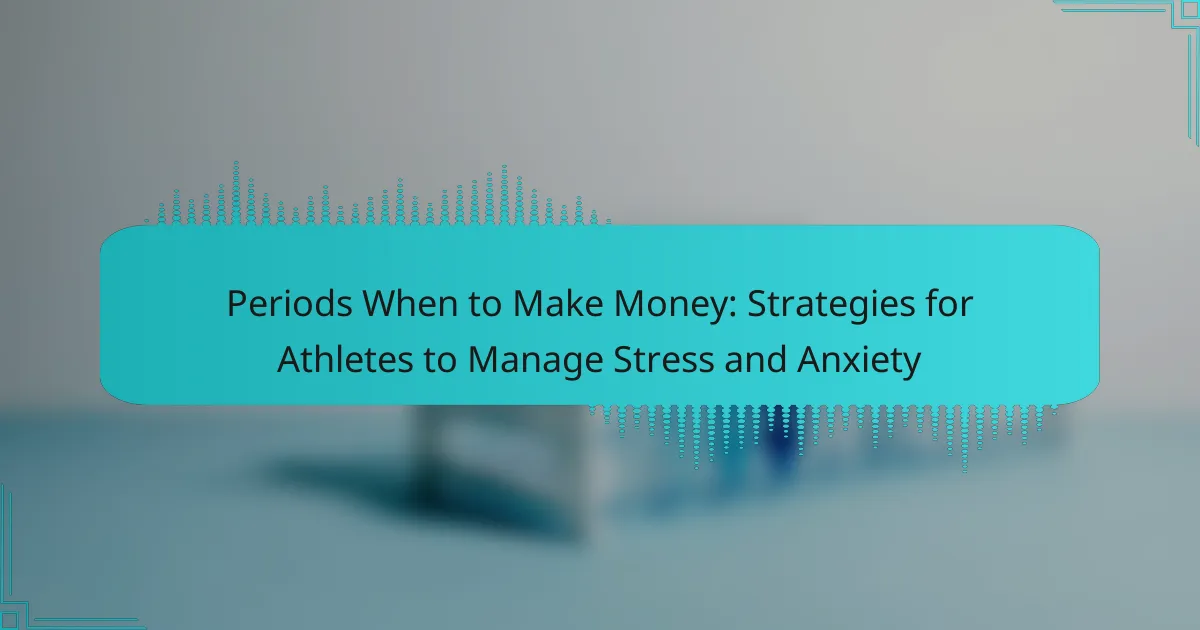Managing stress and anxiety is crucial for athletes aiming to enhance performance. Effective strategies include mindfulness meditation, structured routines, and open communication with coaches. Setting realistic goals and seeking professional support can further improve mental resilience. Incorporating these techniques fosters emotional well-being and helps athletes navigate high-pressure situations.
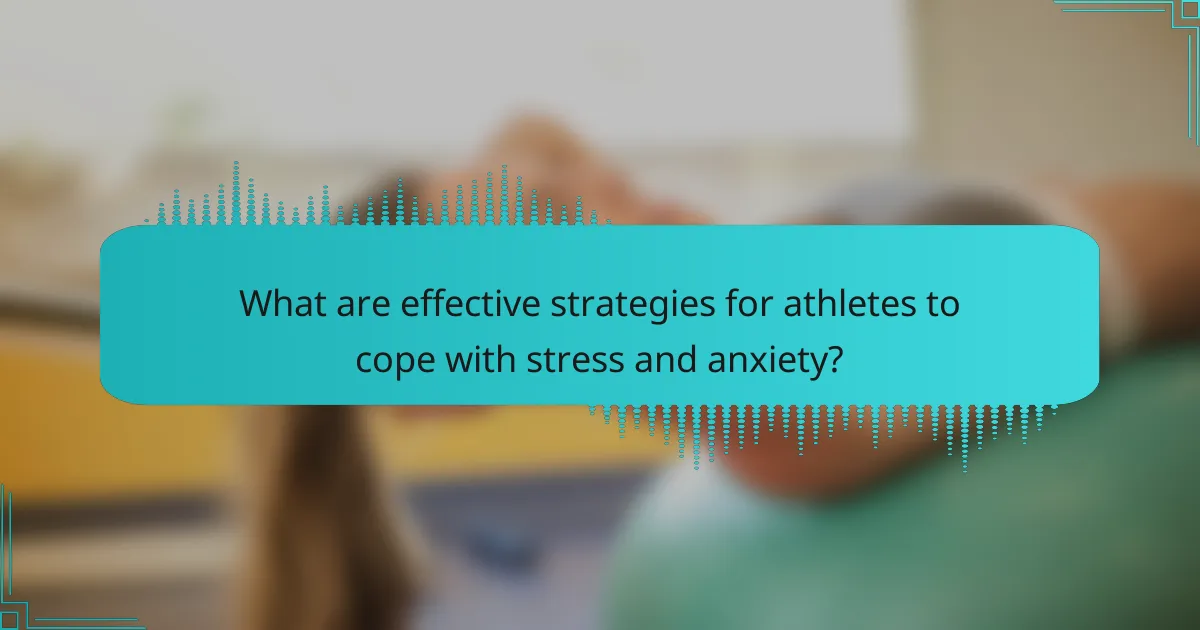
What are effective strategies for athletes to cope with stress and anxiety?
Athletes can effectively cope with stress and anxiety through various strategies. Techniques such as mindfulness meditation, regular physical activity, and structured breathing exercises promote mental resilience.
Establishing a consistent routine helps athletes manage expectations and reduces uncertainty. Engaging in open communication with coaches and peers fosters a supportive environment, enhancing emotional well-being.
Setting realistic goals allows athletes to maintain focus and motivation, mitigating feelings of overwhelm. Additionally, seeking professional counselling can provide tailored coping mechanisms and emotional support.
Incorporating these strategies can lead to improved performance and overall mental health for athletes.
How does stress and anxiety impact athletic performance?
Stress and anxiety negatively affect athletic performance by impairing focus, reducing stamina, and increasing the risk of injury. Athletes often experience pressure to perform, which can lead to mental fatigue and decreased motivation. Managing these factors is crucial for optimal performance. Techniques such as mindfulness, proper nutrition, and structured training can help athletes mitigate stress. Research shows that athletes who engage in mental health strategies improve their performance metrics significantly.
What are common stressors faced by athletes?
Athletes commonly face stressors such as performance pressure, injury concerns, and time management challenges. These factors can lead to anxiety and impact overall well-being. Performance pressure stems from expectations to excel, while injury concerns relate to the fear of setbacks. Time management challenges arise from balancing training, competitions, and personal life. Addressing these stressors is crucial for maintaining mental health and optimizing performance.
What role does mental health play in athletic success?
Mental health significantly influences athletic success by enhancing performance and resilience. Athletes with strong mental health manage stress and anxiety effectively, leading to improved focus and decision-making. Research indicates that mental well-being correlates with higher achievement levels in sports. For instance, studies show that athletes who practice mindfulness techniques experience reduced anxiety and better performance outcomes. Furthermore, addressing mental health can prevent burnout, ensuring sustained athletic careers. Prioritising mental health is essential for athletes aiming for peak performance and longevity in their sport.
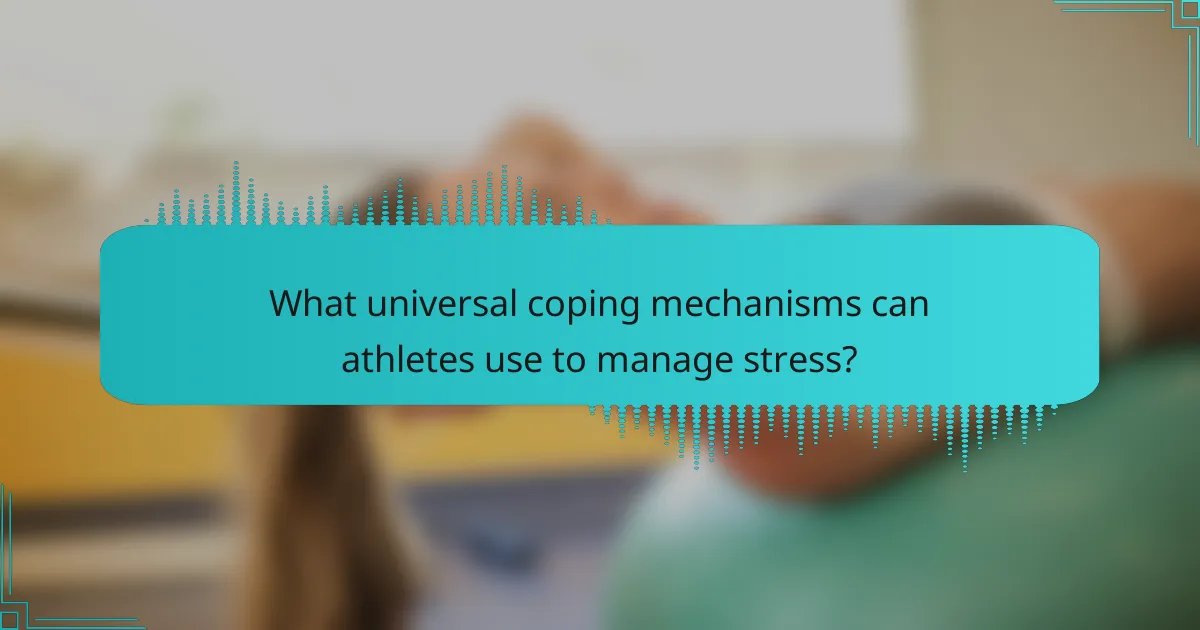
What universal coping mechanisms can athletes use to manage stress?
Athletes can utilise several universal coping mechanisms to manage stress effectively. Techniques such as mindfulness meditation, deep breathing exercises, and visualization can help reduce anxiety and improve focus. Regular physical activity and maintaining a balanced diet also play crucial roles in stress management. Seeking social support from coaches and teammates fosters a sense of community, enhancing emotional resilience. Establishing a consistent routine can provide stability, helping athletes navigate high-pressure situations.
How can physical training routines alleviate anxiety?
Physical training routines can significantly alleviate anxiety by promoting the release of endorphins, improving mood, and providing a structured outlet for stress. Engaging in regular exercise enhances overall mental health and resilience against anxiety triggers.
Studies show that aerobic exercise, such as running or cycling, can reduce symptoms of anxiety by as much as 20-30%. Additionally, strength training has been linked to improved self-esteem and reduced anxiety levels.
The unique attribute of physical training lies in its ability to create a routine, which fosters a sense of control and predictability, crucial for managing anxiety. Furthermore, group training sessions can enhance social connections, providing additional emotional support.
Incorporating physical training into daily life not only benefits physical health but also serves as a powerful tool for anxiety management, promoting long-term mental well-being.
What are the benefits of relaxation techniques for athletes?
Relaxation techniques significantly enhance athletes’ performance by reducing stress and anxiety. These methods improve focus, increase recovery rates, and promote overall mental well-being. Studies show that athletes employing relaxation techniques experience lower cortisol levels, leading to improved physical performance. Techniques such as deep breathing, progressive muscle relaxation, and visualization can create a competitive edge by fostering a calm mindset. Regular practice of these techniques can also enhance resilience, enabling athletes to better cope with pressure during competitions.
How does nutrition influence stress levels in athletes?
Nutrition significantly impacts stress levels in athletes by providing essential nutrients that support mental health. A balanced diet enhances mood and reduces anxiety, which is crucial during high-pressure competitions. For example, omega-3 fatty acids found in fish can lower stress hormones, while complex carbohydrates help stabilize blood sugar levels, preventing mood swings. Hydration also plays a vital role, as dehydration can lead to increased cortisol levels, exacerbating stress. Athletes should focus on whole foods, including fruits, vegetables, lean proteins, and whole grains, to optimize their nutritional intake and manage stress effectively.
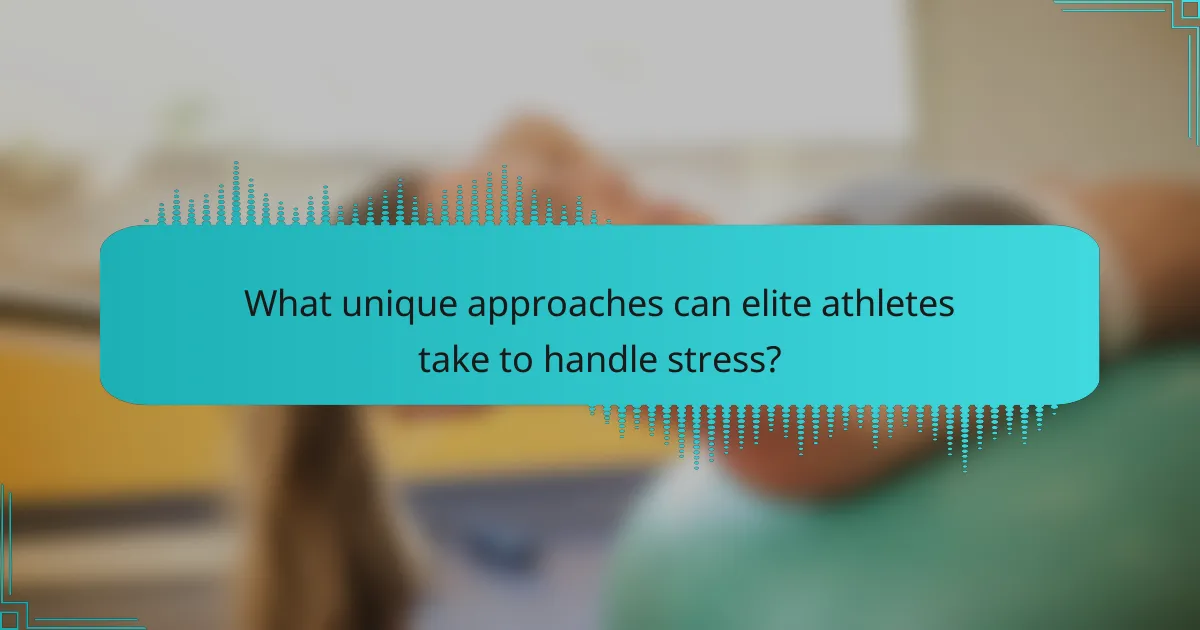
What unique approaches can elite athletes take to handle stress?
Elite athletes can adopt unique approaches to manage stress effectively. Techniques such as mindfulness meditation, visualization, and structured breathing exercises help reduce anxiety and enhance focus. Additionally, developing a routine that includes physical activity and sufficient rest can significantly improve mental resilience. Engaging in open communication with coaches and teammates fosters a supportive environment, allowing athletes to share their experiences and feelings. These strategies, rooted in psychological principles, empower athletes to maintain peak performance under pressure.
How can visualization techniques enhance performance under pressure?
Visualization techniques can significantly enhance performance under pressure by improving focus and reducing anxiety. Athletes can mentally rehearse their actions, which strengthens neural pathways and boosts confidence. This practice can lead to improved decision-making and execution during critical moments. Studies show that athletes who use visualization report lower stress levels and enhanced performance metrics. By regularly incorporating these techniques into training, athletes can develop a mental toolkit that prepares them for high-stakes situations.
What is the significance of sports psychology in stress management?
Sports psychology significantly aids athletes in managing stress and anxiety, enhancing performance. Techniques such as visualization, mindfulness, and cognitive restructuring help athletes develop resilience. These strategies reduce negative thoughts and promote focus during competition. Research indicates that mental training can lead to improved outcomes, emphasizing the unique role of sports psychology in an athlete’s overall success.
How can athletes leverage social support networks?
Athletes can effectively leverage social support networks to alleviate stress and anxiety. Engaging with teammates, coaches, and family provides emotional backing, enhancing resilience. Studies indicate that strong social connections can improve mental well-being, leading to better performance outcomes. Athletes should actively seek and nurture these relationships, fostering a supportive environment that promotes open communication and shared experiences.

What rare but effective practices can athletes adopt for stress relief?
Athletes can adopt rare but effective practices for stress relief, such as nature immersion and art therapy. Nature immersion involves spending time in natural settings, which can reduce stress hormones and improve mood. Art therapy allows athletes to express emotions creatively, fostering mental clarity and relaxation. These practices are unique and can complement traditional stress management techniques, enhancing overall well-being.
How can art and creativity serve as outlets for stress?
Art and creativity serve as effective outlets for stress by providing emotional expression and mental distraction. Engaging in creative activities can lower cortisol levels, promoting relaxation. Studies show that painting, writing, or playing music can significantly reduce anxiety, offering a unique attribute of therapeutic benefits. These activities allow athletes to channel stress into productive outlets, enhancing overall well-being. As a result, integrating art into training routines can improve focus and performance.
What is the impact of mindfulness and meditation on athlete performance?
Mindfulness and meditation significantly enhance athlete performance by reducing stress and anxiety. These practices improve focus, emotional regulation, and resilience, leading to better competitive outcomes. Studies show that athletes who engage in mindfulness report lower anxiety levels and increased concentration during events. Additionally, meditation fosters a positive mindset, enabling athletes to handle pressure effectively. Regular practice can lead to long-term benefits, including improved recovery and overall well-being.
How does engaging in community service help athletes cope with stress?
Engaging in community service helps athletes cope with stress by providing a sense of purpose and connection. This involvement fosters emotional resilience and reduces feelings of isolation. Studies show that community service can decrease anxiety levels by promoting positive interactions and enhancing self-esteem. Additionally, athletes develop valuable coping skills through teamwork and leadership opportunities, which can translate to improved performance in their sport.
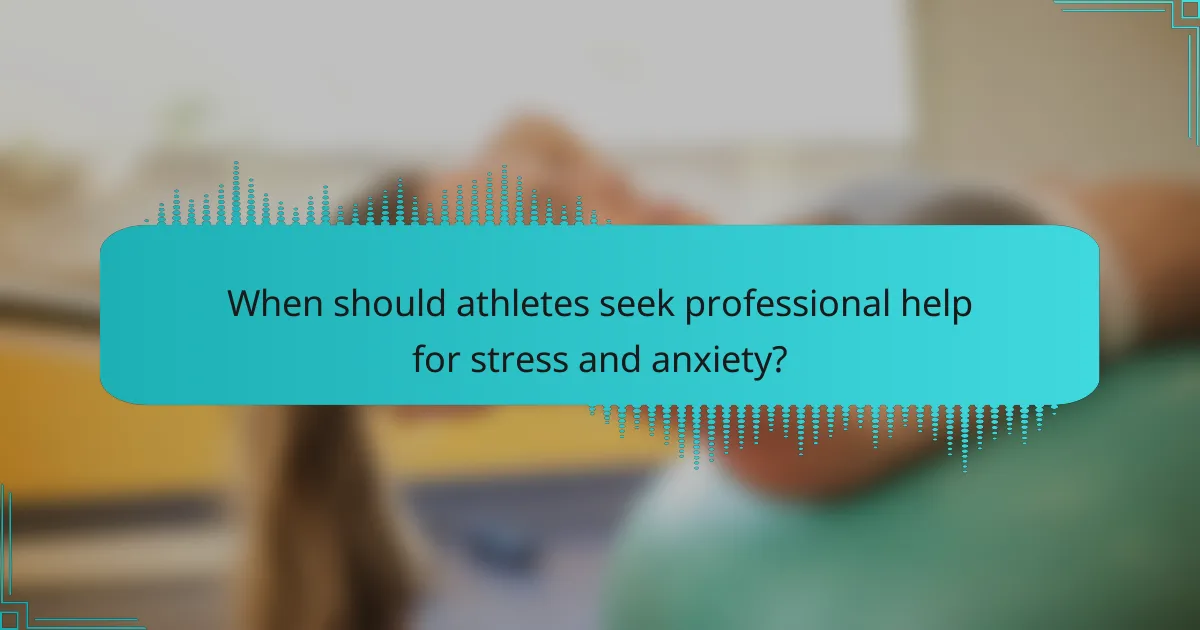
When should athletes seek professional help for stress and anxiety?
Athletes should seek professional help for stress and anxiety when symptoms interfere with performance or daily life. Early intervention can prevent escalation and enhance coping strategies. Signs include persistent fatigue, mood swings, and difficulty concentrating. Professional guidance aids in developing personalized management techniques.
What signs indicate that an athlete needs mental health support?
Signs that indicate an athlete needs mental health support include persistent anxiety, mood swings, withdrawal from social interactions, and decreased performance. Recognising these signs early can lead to timely intervention. Athletes may also experience fatigue, changes in appetite, or difficulty concentrating, which can signal underlying mental health issues. It’s crucial for coaches and teammates to foster an environment where athletes feel safe to express their struggles.
How can athletes find the right mental health professional?
Athletes can find the right mental health professional by assessing their specific needs and seeking referrals. Start by identifying issues such as stress or anxiety related to competition. Research professionals with experience in sports psychology. Verify credentials and read reviews. Schedule initial consultations to gauge compatibility. Prioritise those who understand athletic demands and can provide tailored strategies.
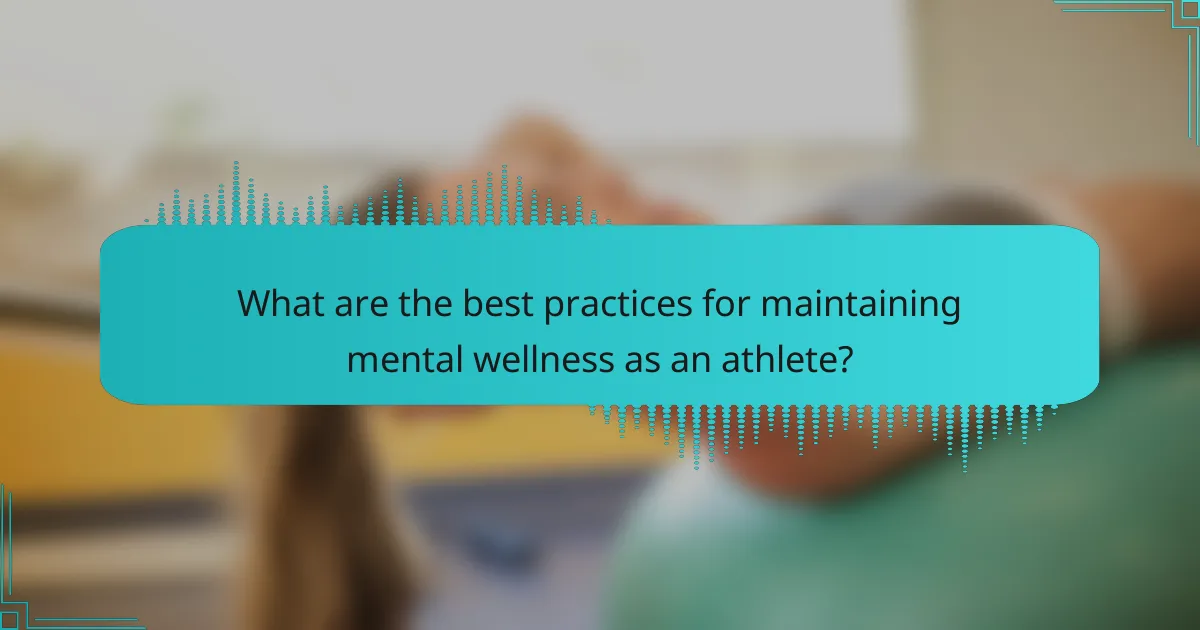
What are the best practices for maintaining mental wellness as an athlete?
To maintain mental wellness as an athlete, prioritise stress management and anxiety reduction techniques. Regular physical activity, mindfulness practices, and adequate sleep significantly contribute to improved mental health.
Incorporate structured routines that include rest days, nutrition planning, and social support systems. Engaging in open communication with coaches and teammates fosters a supportive environment, which is essential for emotional well-being.
Utilise visualization techniques and positive self-talk to enhance focus and reduce performance anxiety. Setting realistic goals helps athletes manage expectations, leading to a healthier mindset.
Lastly, consider professional mental health support when needed, as it can provide tailored strategies to cope with the unique pressures athletes face.
What common mistakes should athletes avoid in stress management?
Athletes should avoid neglecting self-care, relying solely on external support, and ignoring signs of burnout. These mistakes can exacerbate stress and hinder performance. Prioritise mental health by implementing personalized strategies, such as mindfulness and time management. Recognise that stress management is an ongoing process requiring regular evaluation and adjustment.
How can athletes create a personalized stress management plan?
Athletes can create a personalized stress management plan by identifying triggers, setting specific goals, and incorporating effective techniques. First, assess stressors related to training, competition, and personal life. Next, establish clear, achievable goals to address these stressors, such as improving focus or enhancing recovery. Techniques like mindfulness, breathing exercises, and physical activity can be integrated into daily routines. Regularly evaluate and adjust the plan based on effectiveness and changing circumstances.
What are expert insights on balancing competition and mental health?
Expert insights emphasize the importance of prioritising mental health while pursuing competitive success. Athletes can manage stress and anxiety through structured routines, mindfulness practices, and seeking professional support. These strategies enhance performance and overall well-being. Regular mental health check-ins, balanced training schedules, and open communication with coaches contribute significantly to maintaining a healthy mindset. A focus on self-care and recovery is essential, allowing athletes to thrive in both competition and personal life.
